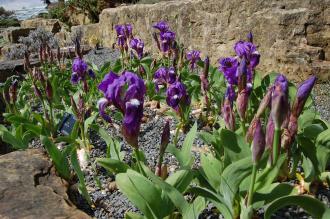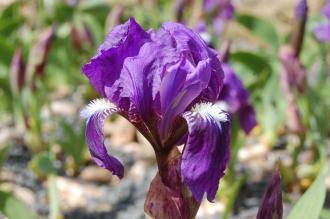
Iris aphylla (23/04/2016, Kew Gardens, London)
Position: Full sun
Flowering period: Spring to early summer
Soil: Moist, well drained
Eventual Height: 30m
Eventual Spread: 30cm
Hardiness: 3b, 4a, 4b, 5a, 5b, 6a, 6b, 7a, 7b, 8a, 8b
Family: Iridaceae
Iris aphylla is a deciduous herbaceous perennial with a clump forming habit. Its gray/ green leaves are sickle shaped with entire margins, emerge from its rhizomes and are up to 40cm long and 3cm broad at their base. Its fragrant purple flowers are up to 7cm across, emerge from a 3-5 branched stem which emerges from the base of the leaf cluster and is up to 30cm tall. Its fruit is a loculicidal capsule. Its roots are rhizomes which allow this plant to steadily spread.

Iris aphylla Flower (23/04/2016, Kew Gardens, London)
The Iris aphylla, commonly known as Leafless Iris, Table Iris or Stool Iris, is native to central and east Europe and Russia. In its native habitat it grows in grasslands, rock hillsides and scrubland.
The etymological root of the binomial name Iris is derived from the Greek word for a rainbow, referring to the wide variety of flower colours found among the many species. Aphylla is derived from the Greek epithet a- menaing ‘without’ and phyllon meaning ‘leaf’.

Iris aphylla Leaf (23/04/2016, Kew Gardens, London)
The landscape architect may find Iris aphylla useful as an effective spreading ground cover plant with attractive flowers.
Ecologically, Iris aphylla flowers are attractive to bees and pollinating insects.
Iris aphylla prefers moist, fertile, well-drained soils. It tolerates most pH of soil.
Iris aphylla requires little maintenance. Large clumps may be divided, this should be carried out up to six weeks after flowering.

Landscape Architecture

